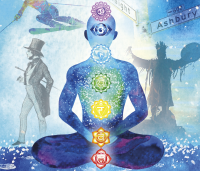
‘A Sense of Something Lost’ by Sue Wells
Beautiful, moving and richly-observed memoir. The voice and the writing style is strong and despite being an intensely personal account, A Sense of Something Lost examines issues that affect us all, and it feels very well-realised. I was deeply moved by Sue Wells' experience, she has the ability to move the reader and the story is deeply upsetting at points. But, she has a lovely, light touch which gives the reader a chance to regroup after dealing with the traumatic events contained in the story. It was a pleasure to read - Alison Taft
Take a look at your life and what do you see? Lots of fragments that don’t quite fit together? Some perhaps with jagged edges – the betrayals, humiliation, not being heard; some with very jagged edges – losses, traumas, injustices…
But look more closely - and then step back - and maybe you can start to see how even those very jagged, upsetting fragments might fit together, work together, like a mosaic. Help you see your life more clearly, meaningfully, warts and all! A bit like looking down at the earth from the moon and seeing your life all at once.
Everyone has a story to tell and can feel trapped by it. Some people’s stories are never told, become family secrets, get lost, jettisoned, forgotten; the more challenging fragments ignored, deleted - never seen as part of a mosaic. I was the same - I saw myself trapped by my own story, restless, incomplete, always searching.
I started writing my memoir over 30 years ago to try and make sense of what happened to me and the daughter I was not allowed to keep because I was 17 and wasn’t married. It was 1964, ironically called the ‘swinging sixties.’ But I couldn’t finish it, it was too painful and I didn’t know the ending.
Parts 1 and 2 , ‘Lost’ and ‘Still Lost’ are set in New Zealand where I grew up and later in the UK spanning several decades. Interwoven with the underlying story of loss, shame and eventual liberation is, apparently, a quirky, sometimes irreverent portrait of the patriarchal society at that time: first filtered through my eyes as a child growing up in New Zealand, then as a disgraced pregnant teenager (1964), later hitch hiking most of the way from New Zealand along the ‘hippie trail’ to London (1969) in an attempt to escape family, country and past. There I was drawn to the early days of the women’s movement (early 70’s), then employed as a social worker in Brixton at the time of the riots (1981) later moving to a peaceful Gloucestershire village where I start to write the memoir and try for another baby.
Before the move, life in my thirties had been mostly good: a big house in London, a gorgeous (second) husband and daughter, a career. But I was haunted by a sense of something missing, a pervasive restlessness, an endless searching until I realised I’d been looking in all the wrong places. It was as if the searching came to me: I was working as a family therapist in London with a dysfunctional family who spookily began mirroring my own. My story became increasingly entangled with theirs. I was suddenly jolted into facing my demons: the loss of my daughter, my lovely mum, banishment by my family, the indelible imprint of unworthiness.
I had spent years skating down wrong alleys and dead ends trying to avoid thinking about what happened – trailing through Africa, then South America, driving to Russia and almost back in a clapped out bright pink camper van – all fuelled by a restlessness that never faded; then years spent searching for answers with the help of husbands, healers, dubious teachers, mediums, mystics and meditation – not forgetting the endless self-improvement sessions trying to shake off the dim beacon that I had allowed to shape my whole life. What was wrong with me?
I had spent so much of my adult life searching – for my lost daughter, for peace of mind, a sense of wholeness. Miraculously, I was reunited with her in 1987 when New Zealand did something unheard of! It opened up all the adoption records retrospectively and offered to help! My daughter was 22 and gorgeous! But my worst nightmare had come true - she had grown up in care from the age of 7. Her adoptive parents had simply abandoned her.
I had always assumed reunion would make me happy in the same way one might search for a new partner, longing for someone or something to make them feel complete.
In Part 3 ‘What Can Never Be Lost’of the book I come across help that challenged me to let go my long-held beliefs, my conditioning, and most importantly to stop searching! For happiness, fulfilment or completion! And trying to have a perfect relationship with my daughter, driven by guilt, to make up for what she had suffered. But I was always behaving as if something were still missing.
Later, still in search of answers, I met extraordinary healers, discovered ancient Eastern mysticism, a radical French psychiatrist, a powerful reading from a Chinese oracle, a salutary argument in a Spanish hotel, a profoundly different understanding of giving and receiving, especially with my estranged, slightly scary daughter. My greatest challenges and sorrows had now become my greatest teachers! And, most important, I learnt how to step back from the story of me, find my true voice and discover that aspect of us that can never be lost.
Sue Wells
Beautifully written...extremely touching and interesting
Lesley Pearse, international No.1 best selling author with over 10 million copies sold
READ A SENSE OF SOMETHING LOST TODAY
Recommended reading
Categories:
0 comments on this article














